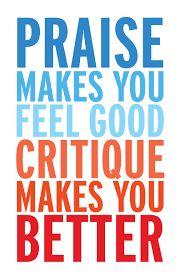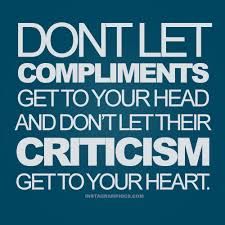Criticism: A Way To Self Improvement
Jun 14, 2019 • 42 views
Nobody likes being criticised but honest constructive criticism is the most valuable tool one can use for self-improvement. Researches have shown that right amount of constructive criticism can be very useful for high performances and also for keeping relationships alive. Researchers arrived at a conclusion, that in order to keep a relationship or work team performing well, five or six positive interactions were needed for every one criticism or negative interaction. Criticism, when given constructively, helps people to improve their performance and behaviour towards others. It makes them realize that they can’t be complacent.

Tips that should be kept in mind before criticising a person are as follows
Criticism should never be made because of your bad mood as it will only hurt the other person and not do any benefit.
Never criticize person’s character, focus on the actions. Then the person can consider the feedback.
Only one critical comment should be given at a time, most things should be shared first.

Constructive criticism has various advantages
Feedbacks can be used as an opportunity to learn about more things and to use it in a better way for gaining more success.
A person cannot always be correct, so criticism should be taken positively. It should be used to know how can a particular thing be improved. It helps to increase the performance and service.
Constructive criticism helps people to analyse their practices and use the better ones. It prevents people from adopting negative practices and helps to find ways to improve their performance.
In businesses, if a business gets feedback and they use it in providing goods and services according to needs of the customers, they can have a competitive advantage over others.
Positive language should be used while given the criticism and while giving response to the criticism. Instead of arguing, discussions should be made so as to get a solution for the problem.
Try not to get offended by criticism when someone immediately doesn’t like your work, never retaliate with negative words even if you feel you are being criticised unfairly as it can harm the reputation.

Ways to give constructive criticism
No one enjoys being criticized. So, people should know how to give criticism as it is a helpful skill to develop while dealing with other people. People often get hurt by criticism, they feel like they are being attacked, even if it’s for their good. What matters the most in giving criticism is not what is being said, but how it is being said. Wrong words and tone of voice can change the true meaning and intention of the feedback, even if it was for the wellbeing of the other person.
Ways to give constructive criticism are:
The person giving the feedback should first praise the other person, then, give him the feedback, and finally tell them that they believe they can make progress using the feedback.
Never attack a person, but try to advise him how he can improve in a particular situation.
Feedback should be given to the other person at a suitable time.
Try to give the feedback by telling a personal story so that the point can be conveyed more easily and properly.
Instead of forcing a thing with harsh words on other person, suggestions should be given about how improvements can be made.
Positive language should be used to give a feedback, as feedbacks given this way can be understood and adopted more easily.
Tone of a person decides how the feedback will be perceived. It should always be considered how a person would like to be approached.
An unnecessary feedback can hurt a person more, so criticism should be given when there is a genuine need.
Experiences helps a person to master in any skill and criticism can be really helpful when given and taken properly at the most suitable time.
